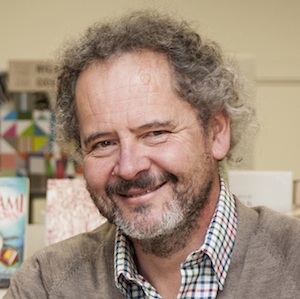Here’s this week’s Nelson Mail column.
Fergus Barrowman has been Publisher of Wellington’s Victoria University Press for thirty years.
As one of the country’s leading publishers, Fergus and the team at VUP are unrelentingly passionate in their support of New Zealand authors and their work.
That support is in part enabled by Creative New Zealand, who are currently reviewing their model for funding local literature.

Fergus Barrowman
CNZ’s allocation to literature activities like writing residencies, awards, professional development, publication support, and festivals and promotion of reading and writing, has dropped from 10-12 per cent to eight per cent of total CNZ spend over the past 10 years.
With this in mind, along with the dismal fact that nearly every great author I know holds down an unrelated day job, writes in snatched hours, and is rarely recognised publicly or financially for their work, I can’t help but ask Fergus – “Why am I bothering trying to be a writer in New Zealand?”
It’s a question I will repeat multiple times over the next few days in Wellington, as I meet with various authors, publishers, literary gadabouts, and my mentor Steven Gannaway.
Creative NZ’s review recognises that the publishing industry is evolving in response to technological and economic changes. They ask how best to support and market New Zealand writers and their work in this new environment, in which publishers and booksellers are being forced to innovate and develop new services, products, and distribution channels.
One of their proposals emphasizes moving more support and responsibility for publishing to individual writers. This would affect the current funding model, which largely funnels projects through established publishers.
While this appears a rational response to changing technology and would allow CreativeNZ to encourage self- and e-book publishing, there are obvious risks to this approach.
For a start, how do we do it without undercutting and essentially killing both our local publishing and independent bookstore industries? And how will writers market their own work?
“It’s easy to publish a book,” says Fergus. “It’s hard to sell it. People come to events, they’re interested, but it doesn’t lead to sales. How do we as publishers, as book lovers, market great New Zealand books?
Fergus points out that about 80 per cent of The Listener’s Top 100 book list this year was international authors, and reminds me that there will be no New Zealand Book Awards next year.
The Awards, which were established in 1968, have been a major support for emerging authors, but having lost their major sponsor, their future is uncertain.
“It seems ironic in the year following the year Eleanor Catton won the international Man Booker prize, that we cannot find money here to sponsor our own New Zealand awards,” says Fergus.
On that note, I head to Unity Books for the launch of Stephanie de Montalk’s ‘How Does It Hurt?’
This is a book that needed utterly no marketing for me. As a fellow chronic pain sufferer, I’ve been following Stephanie’s story for some time. ‘How Does It Hurt?’ is the result of four years of work and a PhD through the International Institute of Modern Letters. It is a mixture of memoir, exploration of medicine and medical language, and incredibly innovative creative writing.
After a fall in 2003, Stephanie developed chronic nerve pain in her pelvis, which left her unable to sit down. The book was written, in more ways than one, standing up and laying down.
(Note – I will be writing a lot more about this book very soon!)
Stephanie is extraordinary. Eleanor Catton is extraordinary. Elizabeth Knox, Witi Ihimaera, and Bill Manhire are extraordinary.
And then there’s me, trying to be a writer. “Why?” I ask Fergus again. His reply – that writers have lives, not careers – leaves me agreeing but dissatisfied. Career paths are not clear cut for many writers, especially of fiction. And yes, we need lives – otherwise, how would we tell stories? We also need to eat.
My mentor, who is known for his “honest” tone, shakes his head at me over our laptops during a workshop the next day.
“Sarah, people think that just doing their best should be rewarded. In a fraught and underfunded industry like creative arts, the scarce rewards go to the best. ”
I take this as a challenge.
Steven is the Executive Director of the New Zealand Writer’s Guild. His job is support screen writers to start their work, finish their work, and see it made. His job with me is to make me laugh when I am laying on the floor in despair. He shared the following exchange.
“A woman arrived in my office with a manuscript. It was poetry. I explained to her that we are the Guild for screenwriters. ‘So you don’t help poets?’ she said. ‘No,’ I replied, ‘they bring it on themselves.’ (I was cackling by this point).
“She stood up smartly and said: ‘Grow a soul!’ to which I replied ‘Write to the edge of the page!’
“As she backed out of the room, yelling ‘Soul!’ I hollered back ‘Paragraphs!’”
This is possibly the best of piece of advice I received all week. Paragraphs mean discipline.
Paragraphs mean poetry and stories and characters that go to the edge of the page and into the reader’s fingers and eyes and brain and soul, never to leave again. Why I am trying to be a writer in New Zealand isn’t a question I need to ask. As I’ve said before – it’s all I’ve ever wanted to do. The real question is how.
And the answer is ‘paragraphs.’

